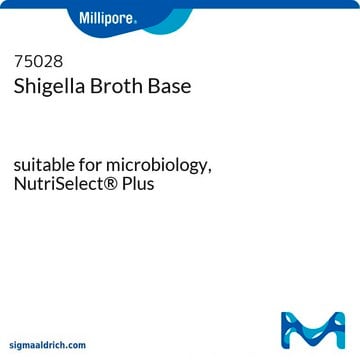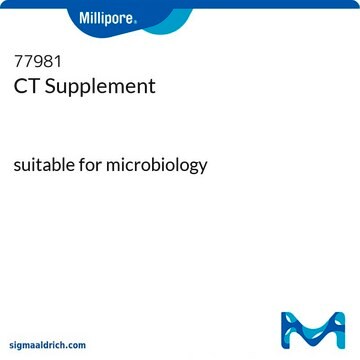08582
Urea solution
suitable for microbiology, 40% in H2O
Synonym(s):
Carbamide, Carbonyldiamide
Sign Into View Organizational & Contract Pricing
All Photos(1)
About This Item
Linear Formula:
NH2CONH2
CAS Number:
Molecular Weight:
60.06
Beilstein:
635724
MDL number:
UNSPSC Code:
41171614
PubChem Substance ID:
NACRES:
NA.85
Recommended Products
Agency
according to ISO 6579-1:2017
form
liquid
shelf life
limited shelf life, expiry date on the label
concentration
40% in H2O
application(s)
clinical testing
environmental
food and beverages
microbiology
storage temp.
2-8°C
suitability
Proteus spp.
SMILES string
NC(N)=O
InChI
1S/CH4N2O/c2-1(3)4/h(H4,2,3,4)
InChI key
XSQUKJJJFZCRTK-UHFFFAOYSA-N
Looking for similar products? Visit Product Comparison Guide
General description
Filter sterilized urea solution recommended for detection of urease activity.
Application
for detection and enumeration of coliform organisms from chlorinated water by membrane filter technique
Components
(per vial, sufficient for 100 mL medium):
Urea 2.0 g, Distilled water 5.0 ml
Urea 2.0 g, Distilled water 5.0 ml
Storage Class Code
10 - Combustible liquids
WGK
WGK 1
Flash Point(F)
Not applicable
Flash Point(C)
Not applicable
Personal Protective Equipment
dust mask type N95 (US), Eyeshields, Gloves
Choose from one of the most recent versions:
Already Own This Product?
Find documentation for the products that you have recently purchased in the Document Library.
Customers Also Viewed
A mechanically and electrically self-healing supercapacitor.
Hua Wang et al.
Advanced materials (Deerfield Beach, Fla.), 26(22), 3638-3643 (2014-02-21)
Oliver C Witard et al.
Brain, behavior, and immunity, 39, 211-219 (2013-10-15)
The present study examined whether a high protein diet prevents the impaired leukocyte redistribution in response to acute exercise caused by a large volume of high-intensity exercise training. Eight cyclists (VO2max: 64.2±6.5mLkg(-1)min(-1)) undertook two separate weeks of high-intensity training while
Sreenivasa C Ramaiahgari et al.
Archives of toxicology, 88(5), 1083-1095 (2014-03-07)
Immortalized hepatocyte cell lines show only a weak resemblance to primary hepatocytes in terms of gene expression and function, limiting their value in predicting drug-induced liver injury (DILI). Furthermore, primary hepatocytes cultured on two-dimensional tissue culture plastic surfaces rapidly dedifferentiate
Freimut Schliess et al.
Hepatology (Baltimore, Md.), 60(6), 2040-2051 (2014-03-29)
The impairment of hepatic metabolism due to liver injury has high systemic relevance. However, it is difficult to calculate the impairment of metabolic capacity from a specific pattern of liver damage with conventional techniques. We established an integrated metabolic spatial-temporal
Guillaume Carissimo et al.
Proceedings of the National Academy of Sciences of the United States of America, 112(2), E176-E185 (2014-12-31)
Arboviruses are transmitted by mosquitoes and other arthropods to humans and animals. The risk associated with these viruses is increasing worldwide, including new emergence in Europe and the Americas. Anopheline mosquitoes are vectors of human malaria but are believed to
Our team of scientists has experience in all areas of research including Life Science, Material Science, Chemical Synthesis, Chromatography, Analytical and many others.
Contact Technical Service






